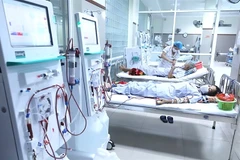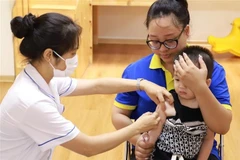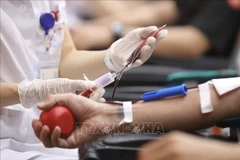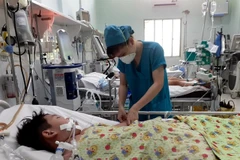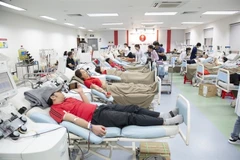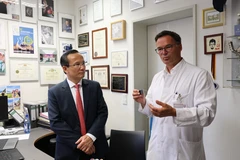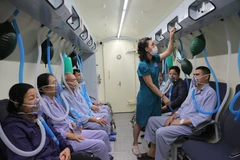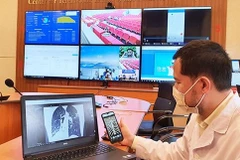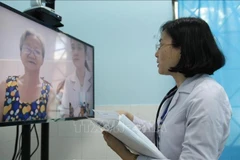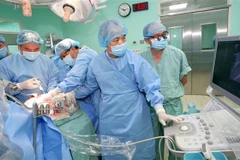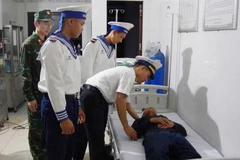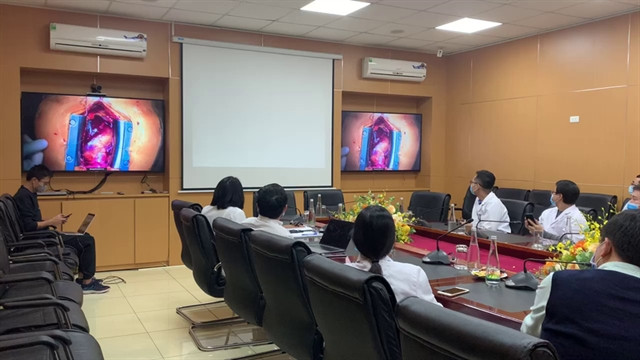 An emergency telehealth session was conducted between the Viet Duc Hospital and Quang Ninh provincial General Hospital, saving the patient's life. (Photo courtesy of Viet Duc Hospital)
An emergency telehealth session was conducted between the Viet Duc Hospital and Quang Ninh provincial General Hospital, saving the patient's life. (Photo courtesy of Viet Duc Hospital) The decision is considered a measure to facilitate people’s accessto health care services and reduce the load for upper-level hospitals.
Recently, in the meeting room of Viet Duc Hospital’s Training& Direction of Healthcare Activities Centre (TDHA), multiple orthopedistsgathered for a consulting session with 25 district-level hospitals.
Prior to the session, data related to the six patients concernedwas extracted from the picture archiving and communication system (PACS) andsent to the hospital deputy director, Dr Nguyen Manh Khanh.
Instead of having to take time out of the meeting to study themedical records, Dr Khanh now can immediately discuss the cases.
In this instance, it was a patient who suffered serious injuriesto their lower body due to a traffic accident.
Dr Khanh said to the medical staff from Thanh Hoa ProvincialGeneral Hospital via the telehealth platform: “The X-ray, CT and MRI imagesfrom PACS show that the three fracture sites are looking great, which means thesurgery had gone well.”
The Thanh Hoa General Hospital started using PACS three years ago,which helps with storing images without printing.
With this technology, doctors from other locations can accuratelyview and monitor the image data, rather than photos of the actual films.
The hospital is also one of the few facilities across the countrythat have put in place digital medical records rather than traditional paperones.
The telehealth sessions are not only for consultation but alsospecial “classes” where doctors from the Viet Duc Hospital can comment onproblem-solving techniques and share their knowledge with colleagues at thedistrict level.
Dr Khanh said: “A case can happen in one location but could be anecessary lesson for many colleagues in other places.
“Therefore, it is necessary to have the space for analysing anddiscussions on the possible scenarios when similar cases happen, and therebyputting forward the optimal solutions.”
In addition to the regular sessions, the Viet Duc Hospital’sdoctors have also been participating in complicated, critical cases in thelower-level hospitals.
This has allowed the medical staff to act within the ‘golden hour’during emergencies.
One of these cases was that of a 58-year-old patient in Quang NinhProvincial General Hospital who was diagnosed with a broken heart due to atraffic accident.
This was a rare case that usually could only be handled byupper-level hospitals, however, the patient’s critical conditions could resultin death if she was to be transferred to Hanoi.
An emergency telehealth session was set up between the Viet DucHospital and Quang Ninh Provincial General Hospital for her emergencyopen-heart surgery, and the patient was saved.
In 2021 and 2022, the Viet Duc Hospital has conducted more than190 telehealth sessions not only with doctors but also nurses, said Dr Khanh.
The Ministry of Health (MoH) has planned to promote theapplication and development of digital health care platforms in the NationalDigital Transformation Programme by 2050, with a vision to 2030.
In this plan, telehealth sessions are considered a key factor indigital transformation of the health care sector.
Since June 2020, the number of upper-level hospitals included inthe pilot for the technology has increased from 24 to over 100.
Nguyen Truong Nam, deputy director of the MoH’s informationtechnology department said that as of current, the ministry has launched 1,000local connection points for telehealth sessions.
Mentioning the critical cases that could not handle the longtravel distance if transferred, Dr Khanh hoped that more health carefacilities, especially those in remote areas, will be included in the network.
He added that he wished to share the medical data and systems inan encrypted and coherent manner so that better telehealth sessions will beconducted, promptly providing treatment to patients./.





